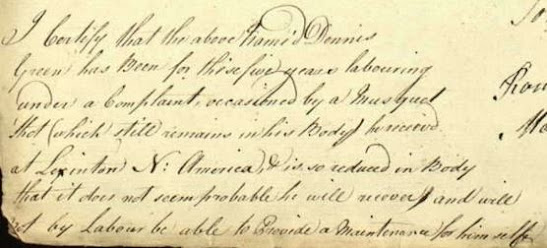Dennis Green was just thirteen years old when he joined the 5th Regiment of Foot in 1765. Born in the town of Mallow in County Cork, Ireland, he was probably the son of a soldier in the regiment and probably started his service as a drummer. By 1774, though, when the regiment arrived in Boston, he was 5 feet 11 1/4 tall, just right for the regiment's grenadier company.
Late in the evening of April 18, 1775, the grenadiers and light infantry from regiments in Boston were quietly assembled, ferried across the Charles River, and in the first hours of April 19 set off for Concord, a town twenty miles inland. By the end of that day the British army in America was at war with rebelling American colonists, and Dennis Green was among the war's first casualties and first prisoners. He was hit by a musket ball somewhere along the arduous retreat from Concord back to Boston, and left behind with a number of other wounded soldiers. Doctors were unable to remove the ball, and it remained in his body.
Some time between April and June 1777 he found his way back to his regiment. Whether he escaped or was exchanged has not been determined, but he was fit enough to go back into the grenadier company. He went with them to Philadelphia in 1777, and back to New York in 1778, then - as far as can be determined from the incomplete surviving muster rolls - continued with the regiment to the West Indies. By 1783, with hostilities ended, Green one among the many soldiers discharged as the size of the army decreased.
Dennis Green's discharge from the 5th Regiment, a printed form with personal details filled in that confirmed his obligation to the army was over, reveals the details about him related above - his age, place of birth, how long he had been in the army, and his height. It also includes a statement from an army surgeon:
I certify that the above nam’d Dennis Green has been for these five years labouring under a Complaint, occasioned by a Musquet shot (which still remains in his Body) he received at Lexinton N. America, & is so reduced in Body that it does not seem probable he will recover) And will not by Labour be able to Provide a Maintenance for himself.
He was out of the army, but carried with him a token of his first day at war. He was granted a pension.Either the musket ball in his body was eventually removed, or somehow it did not cause him undue pain, for seven years later, in 1790, he enlisted in the army once again. He joined the 11th Regiment of Foot, was appointed corporal, and served for twenty months before being discharged and put on the pension rolls once again. This time no mention was made of a ball in his body; his discharge indicates that he suffered from "a Colliquative Diarrhea." He signed his name on his discharge, and there is no record of him serving again in the army.
